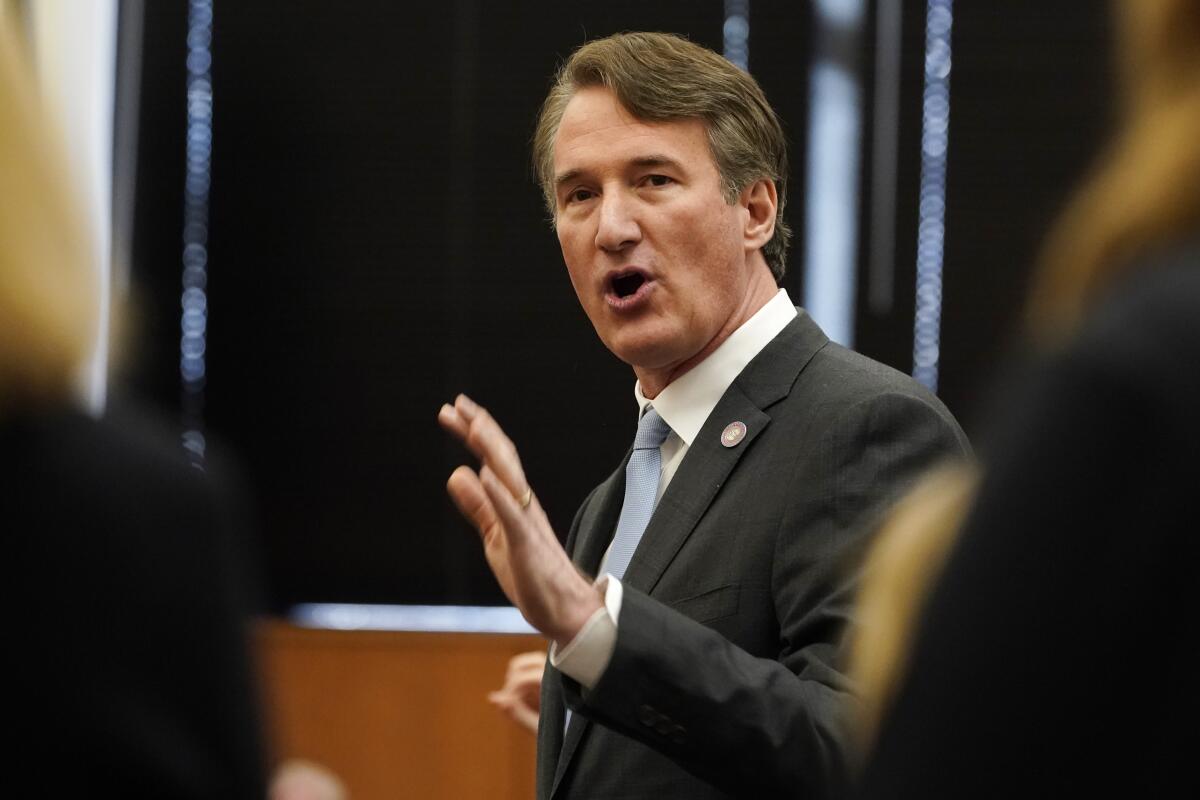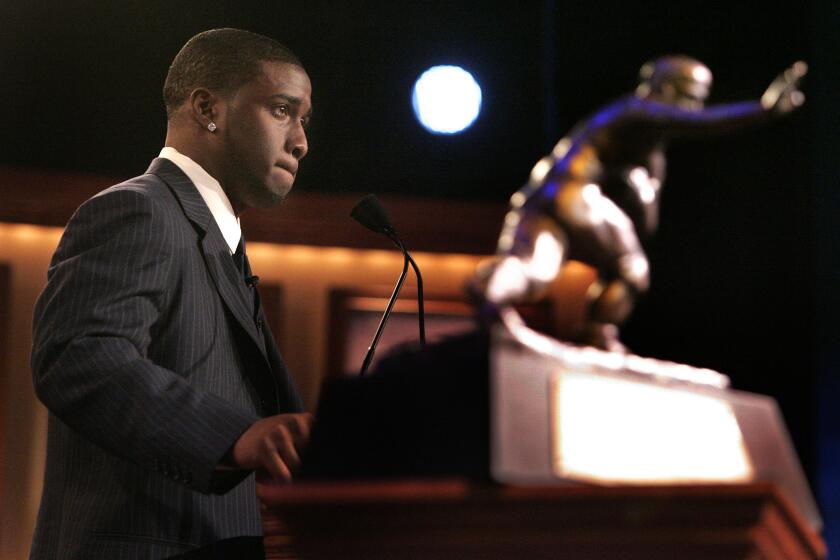Column: Legislation targets teachers for lessons on “divisive” subjects, student confidentiality

Threats of litigation, pulled credentials and a “tip line” to report teachers giving lessons on controversial subjects loom over schools in some states
What students are taught, what they should read and what books are appropriate for school libraries have long been matters of dispute in communities across the country.
But growing efforts to ban books and lessons on key aspects of U.S. history and culture have taken an intimidating turn, targeting teachers and other school employees.
In Virginia, newly-elected Gov. Glenn Younkin is backing a tip line where people can report teachers for discussing “inherently divisive concepts.”
In Arizona, legislation is pending that would punish teachers who withhold from parents certain information shared by students in confidence, including issues about sexual orientation or gender identity.
In Florida, a bill is moving ahead to prohibit schools and businesses from making people “feel discomfort, guilt, anguish, or any other form of psychological distress on account of his or her race, color, sex or national origin.”
What’s happening here is an outgrowth of the cultural and political divide wracking the nation, with this particular movement in education at the moment being pushed by conservative officials, organizations and parents.
Robust debate that includes parents over what and how to teach their children often is a sign of a healthy society. But the threatening nature of current tactics not only has the potential to harm teachers dedicated to the best interests of students, but can deprive those students of important knowledge that can further their education and help them navigate the life ahead.
One of the latest in a string of these controversies came from the McMinn County School Board in Tennessee when it unanimously voted to remove “Maus,” a Pulitzer Prize-winning graphic novel about the Holocaust, from the eighth-grade curriculum. The book, originally published in 1980, tells a story about the atrocities using images of mice as Jews and cats as Nazis.
Some parents objected to some of the language and a small image of female nudity in the book, though the latter wasn’t depicted in a sexual way. News coverage has been widespread, though there was little commentary about whether students found the book objectionable.
Art Spiegelman, author of “Maus,” said he was an early adapter to the graphic novel genre because it provides a breakthrough and entry point that other books can’t. He noted “Maus” has been in schools for years.
In another recent example, the Wentzville School Board in Missouri narrowly voted to remove a handful of books from the district’s libraries, including “The Bluest Eye” by Toni Morrison. It’s hardly the first time a novel by the Nobel and Pulitzer Prize-winning author has been targeted by groups aiming to ban certain books that deal with race, gender or sexuality from libraries and schools.
The book is about a young Black girl during the Great Depression who prays for blue eyes because she feels ugly and inferior to blond-haired, blue-eyed White girls seemingly beloved in America.
The New York Times recently noted that book challenges haven’t always come from the political right. “Of Mice and Men” and “To Kill a Mockingbird,” for example, have been challenged over the years for how they address race.
If the wave of book banning is an alarming trend, the actions targeting teachers, other school employees and districts, is even more so.
Youngkin became the first Republican elected governor in Virginia in nearly a decade for numerous reasons, but his campaign advocating a “parents’ rights” movement to take on school policies became a focal point. The centerpiece of that strategy was his pledge to ban the teaching of critical race theory in classrooms. Education officials said it wasn’t being taught in Virginia schools, but that didn’t seem to matter much.
Critical race theory was a relatively obscure concept until conservatives elevated it as a political issue over the past year. Its main theme is that racism is not just perpetuated by individual biases but has been embedded in the U.S. legal system and governmental policies. It has become a coast-to-coast battle, as the Union-Tribune’s Kristen Taketa has chronicled in the disputes in San Diego County.
But the criticism quickly broadened to ethnic studies, policies to achieve educational equity and, according to the rationale behind Youngkin’s tip line, apparently what people may deem to be “inherently divisive.”
The Richmond Times-Dispatch said the definition in legislation supported by Youngkin includes teaching that one race is “inherently racist, sexist, or oppressive, whether consciously or subconsciously,” and that “meritocracy or traits, such as a hard work ethic, are racist or sexist or were created by a particular race to oppress another race.”
Taking steps to facilitate parents’ ability to communicate with school officials their concerns — or what they like — about what’s happening in schools usually is to be applauded. But the potential for intimidation and abuse with the tip line looms large.
At the outset, it appeared to have a chilling effect, according to Dianne Carter de Mayo, a history teacher in Virginia’s Gloucester County.
De Mayo told the Times-Dispatch she got a call from an elementary school teacher who “had been assigned the bulletin board of the month, which in February would usually be themed for Black History Month. She was saying, ‘What if I get reported to the governor for what I put up?’ It’s horrifying.”
The Arizona bill has the potential to upend the common reality that a teacher is often a person students choose to confide in. The legislation bars withholding information that is “relevant to the physical, emotional or mental health of the parent’s child,” specifically mentioning the “purported gender identity” of the student or a student’s request to transition if the identity “is incongruous with the student’s biological sex.”
Teachers who don’t come forth could have their certification pulled, and the bill allows parents to sue school districts if they learn information about their child was not reported.
Yes, parents should know what’s going on with their kids. It would be great if children in all families felt comfortable, or weren’t scared, to tell their parents intimate details of their lives. But that’s not always the case and they may have good reason for keeping such matters confidential.
The Florida “discomfort” legislation doesn’t specifically mention critical race theory, but it’s in the bill analysis given to state senators and was mentioned by Gov. Ron DeSantis when he announced the proposal, according to CNN.
Nothing should be off limits for debate over what should and shouldn’t be taught in schools. Ideally, that discussion primarily would be among educators, parents, students and school officials. It’s disheartening, though not surprising, that much of this is being hijacked to create political wedge issues.
Then there’s the matter of logic behind banning books and information being turned inside out.
“This denies our students the opportunity to gain important facts, core knowledge, formulate their own opinions, and to think for themselves,” Youngkin said in his order prohibiting critical race theory in schools.
That’s some “1984”-level stuff right there.
Get Essential San Diego, weekday mornings
Get top headlines from the Union-Tribune in your inbox weekday mornings, including top news, local, sports, business, entertainment and opinion.
You may occasionally receive promotional content from the San Diego Union-Tribune.












